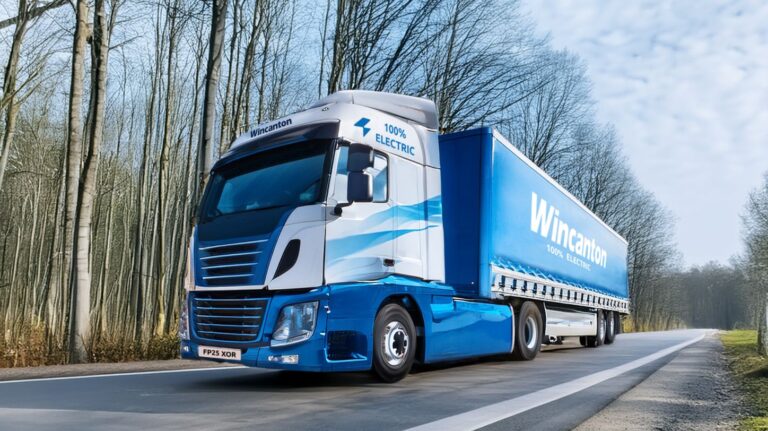Wincanton has announced that it has taken delivery of the first of 24 new electric trucks set to join its logistics fleet by the end of the year.
Part of a multi-million-pound project, these trucks will be in operation on the UK’s roads this summer.
The move has been described by Wincanton as ‘a significant milestone as part of the company’s investment in the necessary solutions to reach net zero carbon emissions by 2040’.
DAF Trucks, Volvo Trucks and Renault Trucks are the manufacturers supplying these 24 vehicles to Wincanton. All of the trucks will be able to operate at more than 40 tonnes, and are expected to reduce Wincanton’s CO2 emissions by 2,400 tonnes per year.
Wincanton is expecting to gain ‘valuable insights’ from this project that will ‘help the business to lay the foundations for decarbonising its fleet at an even greater scale’.
Carl Hanson, managing director of Transport, at Wincanton, said: “Sustainability is at the heart of everything we do, with collaboration fundamental to achieving our net zero goals.
“By pioneering new vehicle technologies, we’re cutting carbon and delivering smarter, greener solutions for our customers. And, with these HGVs marking a major step forward in our commitment to a more sustainable supply chain, this important milestone will help us learn and adapt for the future. We can’t wait to see the new trucks in action.
“Low-emission vehicles like these are undoubtedly the future of logistics, but widespread adoption is still years away. In the meantime, businesses can act now by using today’s technology to increase efficiency and reduce emissions. Unlocking greener supply chains hinges on collaboration and optimisation.”
A panel of experts from Wincanton will take part in a fireside-style discussion surrounding the use of digital transport technologies to reach net zero goals at this year’s Sustainable Supply Chain Conference, returning to London on 24 June 2025. Click here to find out more about Wincanton’s session!
To support the rollout of these new eHGVs, Wincanton is implementing depot-based charging infrastructure across a number of its sites across the UK, including in London, Portbury, Glasgow and Corby.
It anticipates that this infrastructure will enable the ‘seamless integration’ of EVs into its fleet. The charging infrastructure has been designed and built in partnership with Voltempo and Gridserve. Wincanton describes such systems as ‘crucial for the transition towards sustainable fleet operations’.
Speaking on Wincanton’s eHGV adoption project, Simon Buckley, knowledge transfer manager for zero-emission mobility at Innovate UK, commented: “It’s great to see Wincanton take delivery of 24 electric HGVs.
“We look forward to the real-world demonstrations and collaboration as part of Project Electric Freightway eFREIGHT 2030, under the wider Zero Emission HGV and Infrastructure Demonstrator (ZEHID) programme, funded by UK government and delivered in partnership with Innovate UK.
“These initiatives will generate valuable insights into the future of zero-emission freight in the HGV sector. Innovate UK is proud to support this pioneering effort, which plays a key role in accelerating the shift to zero-emission freight and advancing the UK’s net zero ambitions.”
Want to hear more about the ZEHID programme? Jesse Prendergast, knowledge transfer manager at Innovate UK Business Connect, will be discussing the breadth of the infrastructure, barriers to adoption, navigating challenges and what he has observed in the programme so far at the Sustainable Supply Chain Conference this month. Keep an eye out on the Logistics Manager website for more information on Prendergrast’s session and click here to register now!







